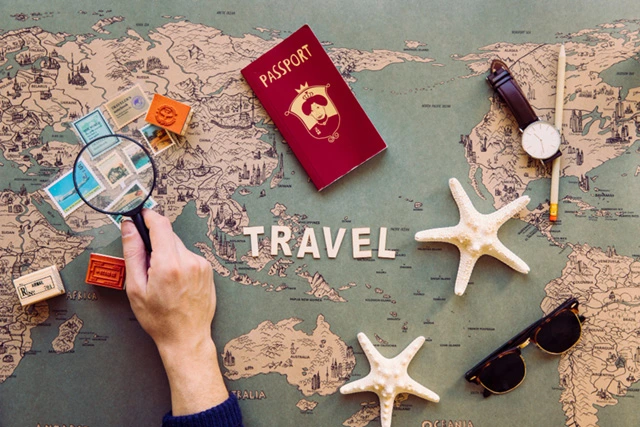Planning your next trip? Check out this article on “How to Make and Stick to a Travel Budget” for expert tips on managing your finances efficiently. Stay within your budget while exploring the world’s wonders. Travelling is one of life’s great joys and privileges. However, failing to budget properly for a trip can turn the adventure into a stressful headache.
By crafting a realistic travel budget ahead of time and sticking to it, you can prevent overspending. make the most of your hard-earned money useful in vacation days. This detailed guide breaks down everything you need to know to make and responsibly follow a travel budget.
Travel Budget Checklists: An Essential Guide for Planning Your Next Trip
1. Assess Your Financial Landscape
Before jetting off, take a detailed look at your current financial situation. Factor in your income, existing expenses, and any upcoming financial obligations. This will provide a clear picture of how much you can allocate to your travel budget without compromising your financial stability.
When it comes to embarking on a memorable adventure, sticking to a travel budget is crucial. Setting a clear and realistic budget can ensure that you make the most of your journey without financial stress. Here’s how to create and stick to a travel budget without sacrificing the quality of your experience.
2. Determine the Scope of Your Travel
Decide on the destinations you wish to visit and the duration of your trip. Research the cost of living and travel expenses in each location to establish a realistic budget. Consider all potential expenditures, including accommodation, transportation, meals, activities, and souvenirs.
3. Research, Plan and Compare
Thorough research and careful planning can significantly impact the effectiveness of your travel budget. Look for cost-effective travel options, including affordable accommodations, discounted transportation, and budget-friendly activities. Booking in advance and leveraging travel rewards programs can also lead to substantial savings.
To make the most of your travel budget, invest time in researching and comparing prices for flights, accommodations, and activities. Use comparison websites, read reviews, and consider using price-tracking tools to find the best deals. It is also worth exploring alternative options such as staying in hostels or booking through vacation rental platforms to stretch your budget further.
4. Calculate Expected Costs
The first key step is clarifying how much your desired travel plans will cost. Conduct thorough research online to estimate expected prices for flights, accommodation, local transportation, food, activities, emergencies, etc. in your chosen destination.
Be sure to calculate the costs for every traveller and the entire length of your trip. Make use of sites like BudgetYourTrip, Numbeo, and CostOfLiving to find typical prices travellers pay for their hotels, meals, and cultural experiences. This data will make constructing an accurate budget much easier.
Transportation
One of the significant expenses to consider is transportation. Whether you are traveling within your own country or venturing abroad, carefully evaluate the cost of flights, train tickets, or car rentals. Additionally, don’t forget to account for local transportation expenses, such as taxis or public transit, in your daily travel budget.
Accommodation
Finding suitable and budget-friendly accommodations is essential for any traveler. Consider options such as budget hotels, bed and breakfasts, or even staying with locals through homestay programs or vacation rental platforms. Leverage the power of online reviews and compare prices to secure a comfortable and affordable place to rest during your trip.
Meals
Food expenses can quickly add up, especially if you eat out for every meal. One way to manage your food budget is by sampling local cuisine from street vendors or local markets. Not only will you get a taste of the authentic flavours of your destination, but you can also save a significant amount of money. Additionally, consider booking accommodations with access to a kitchenette, allowing you to prepare some of your meals and further reduce costs.
Activities and Sightseeing
Exploring new destinations often involves a range of activities and sightseeing opportunities. Before arriving at your destination, research the entrance fees and costs associated with popular attractions. Allocate a portion of your travel budget specifically for these activities, and consider purchasing any necessary tickets or passes in advance to save money and time.
Miscellaneous Expenses
Aside from the major expenses, it is important to account for miscellaneous costs that may arise during your trip. This includes travel insurance, visa fees, souvenirs, and any unexpected expenses that may occur. Setting aside a buffer in your budget for these miscellaneous expenses will help ensure that you are prepared for any unforeseen circumstances.
Prioritize Experiences over Material Possessions
When planning your travel budget, remember that the memories and experiences gained from your trip are far more valuable than material possessions. Instead of splurging on unnecessary luxury items, focus on creating unforgettable moments and immersing yourself in the local culture. Investing in experiences rather than things will ultimately enhance the overall quality of your trip.

5. Set Your Budget
With expected costs identified, decide on an overall trip budget based on your financial situation. Determine what you can reasonably afford to spend without going into debt. Add up the anticipated costs and allocate specific amounts to each expense category in a spreadsheet. Pad each section with a bit of extra cushion.
If your researched estimates exceed your available funds, you’ll have to reconsider aspects like destination, duration, or lodging class. Set your budget somewhat below your total funds so you have leftover savings as a buffer.
Maximizing Budget-Friendly Adventures
Discovering economical yet captivating activities is key to sustaining your travel budget. Seek out complimentary walking tours, explore public parks and museums with free admission, and engage with local communities to partake in budget-friendly cultural experiences.
6. Ways to Trim Costs
If you can’t reach your initial budget goal, getting creative with ways to trim costs can help bridge the gap. Some popular options include travelling during shoulder season, booking budget airlines, choosing lesser-known destinations and attractions, utilizing public transit instead of cabs, staying in hostels or Airbnbs, preparing your meals, and more.
Find out what trade-offs you’re willing to make between desired experiences and saving money. Discovering new cheaper alternatives can make travel more affordable.
7. Embracing Flexibility in Spending
While adhering to a set travel budget is crucial, allowing room for flexibility can enhance your overall experience. Allocate a portion of your budget for spontaneous activities or indulging in local delicacies, ensuring a dynamic and enriching journey.
8. Navigating Financial Constraints Abroad
When travelling to a foreign country, familiarize yourself with the local currency and exchange rates to better understand the financial landscape. Utilize credit cards with minimal foreign transaction fees and withdraw cash from ATMs with favourable exchange rates to optimize your spending while abroad.
9. Choose Payment Methods
Paying with cash or set amount prepaid cards are useful strategies to stick to allotted spending categories during your trip. Using credit irresponsibly can quickly blast your budget. But having one credit card on hand for emergencies is wise.
Travel reward credit cards also let you earn points and miles that save you money on future trips when used selectively. Only bring your designated trip budget funding sources to minimize the temptation to overspend.
10. Adjust as you Go
Check in with your budget periodically throughout your travels to ensure you’re staying on track. It’s okay to move amounts between categories if certain aspects cost more than expected while you underspend in other areas. Recording all expenses as you go lets you see where you stand. Avoid constantly dipping into your emergency fund as that should only be used for true unanticipated crises.
Reflect and Adapt
After returning from your journey, evaluate your budgeting success. Identify areas where you exceeded or stayed below budget and assess the reasons behind these outcomes. Use this insight to refine your future travel budgets and enhance your financial planning skills.
Crafting and adhering to a solid travel budget liberates you to enjoy your trips knowing you aren’t financially sabotaging yourself in the process. Do your planning homework, make deliberate trade-offs, bring limited payment methods, and check in often to master stress-free budget travel that enriches rather than burdens your adventures. What tips do you have for sticking to a travel budget? Share your best budgeting secrets!
In conclusion, crafting and adhering to a travel budget is a powerful tool for unlocking unforgettable adventures without incurring unnecessary financial strain. By conducting thorough financial assessments, establishing realistic budgets, and embracing cost-saving strategies, you can ensure that your travels are enjoyable and financially sustainable. So, set your budget, embark on your adventures, and revel in the freedom of worry-free exploration.
